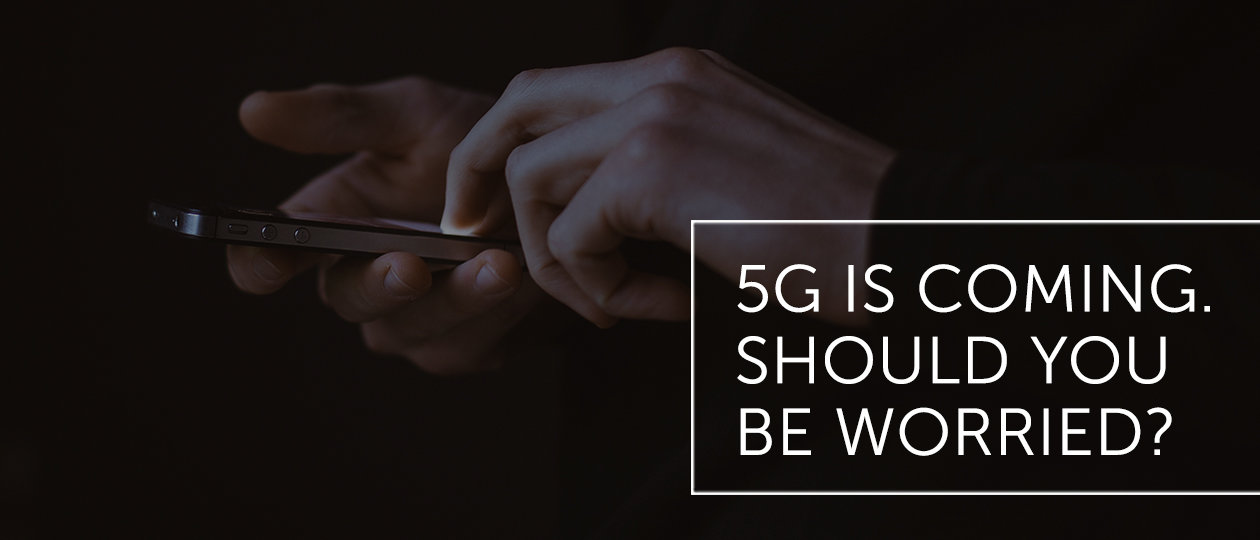5G is Coming. Should You Be Worried?
You have may heard about 5G (short for 5th Generation mobile networks or wireless systems) technology and its lightning-fast data speeds. We live in a world where we want data instantaneously. But is it worth the possible health risks?
Telecommunications companies are racing to install new equipment and turn on their mobile 5G networks. This rollout has already begun in cities like Austin, Los Angeles, Nashville, Orlando, San Diego and San Jose and may be in your city soon.
Current 4G LTE technology relies on about 200,000 cell phone towers around the U.S. 5G technology, however, requires a denser network, which means lots of cell towers that are closer together. These cell towers are being placed on street light poles and the sides or tops of buildings. In other words, these towers, which may reach the millions, will permeate our city streets and neighborhoods.
In fact, U.S. wireless companies say they'll have to install about 300,000 new antennas, according to a CBS News story. Some residents in these areas where antennas are going up are becoming concerned because of possible health dangers. There have even been protests organized by concerned U.S. citizens over the potential dangers.
There has also been international concern. Nearly 240 international scientists and physicians from 40 countries have actually called for a 5G moratorium until we better understand the possible health implications. The 5G Appeal states, “5G will substantially increase exposure to radiofrequency electromagnetic fields RF-EMF, that has been proven to be harmful for humans and the environment…. and on top of the increased number of 5G-transmitters (even within housing, shops and in hospitals) according to estimates, “10 to 20 billion connections” (to refrigerators, washing machines, surveillance cameras, self-driving cars and buses, etc.) will be parts of the Internet of Things.”
Unfortunately there have been few studies to uncover the health risks of 5G technology, so many scientists are calling for more research.
Dariusz Leszczynski, an expert in molecular biology and adjunct professor at the University of Helsinki, Finland, told Euronews: “The assurances of safety concerning 5G-emitted radiation are based solely on the assumption that low amounts of radiation are safe, not on biomedical research.” And he notes that no one really knows how the high frequency waves of 5G will affect our immune systems. “High-frequency waves only penetrate a few millimeters into the body and this is being used as a 'no worries' card by industries — but our skin is the biggest organ in the body and is linked to numerous things including immune response.”
5G cell towers can be more dangerous than other cell towers for two main reasons. First of all, 5G is ultra high frequency and ultra high intensity. Second, since the shorter length millimeter waves (MMV) used in 5G do not travel as far (or through objects), with our current number of cell towers the cell signal will not be reliable. To compensate, as I’ve mentioned, telecommunications companies are installing mini cell towers in close proximity to one another, greatly increasing potential RF Radiation exposure.
The real impact of RF Radiation is how close the source is to our physical bodies rather than the power level (or wattage) of the radiation. RF Radiation dissipates with distance. In other words, a low powered exposure right next to someone, is more dangerous than a more powerful exposure a long ways away. Also, the longer the exposure time is, the more dangerous it is. 5G will have more sources in closer proximity to us.
So while telecommunications companies are forging ahead to release 5G technology, the long-term effects are relatively untested.
It’s always wise to stay informed about issues that may impact your health. As 5G becomes more widespread, stay diligent about keeping updated about the possible health implications.
Have a blessed, wonderful day!
Alex Loyd



